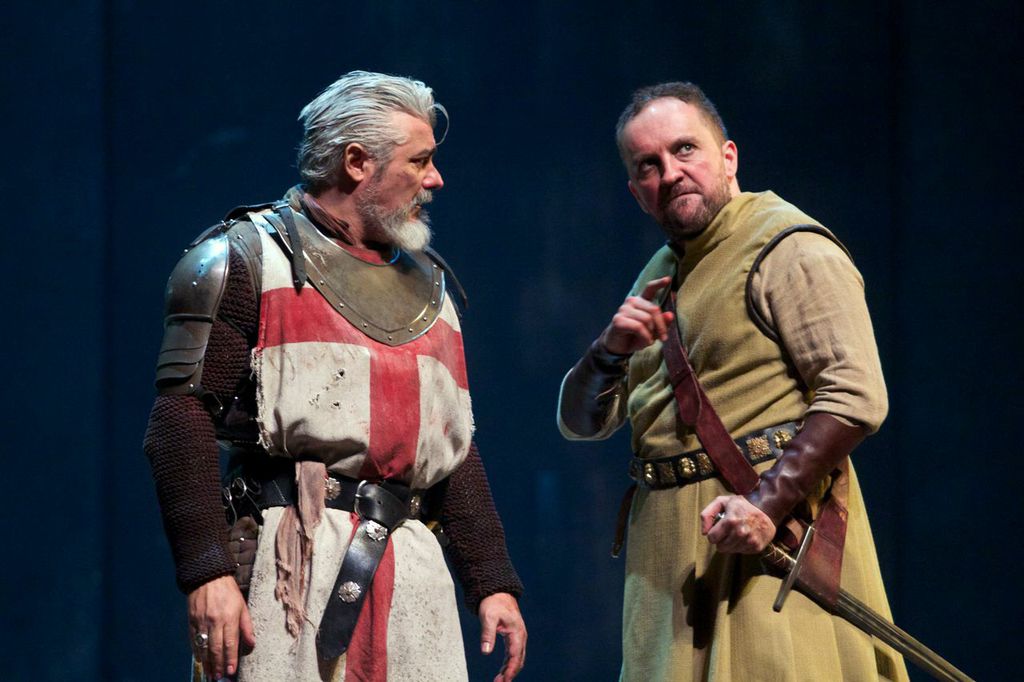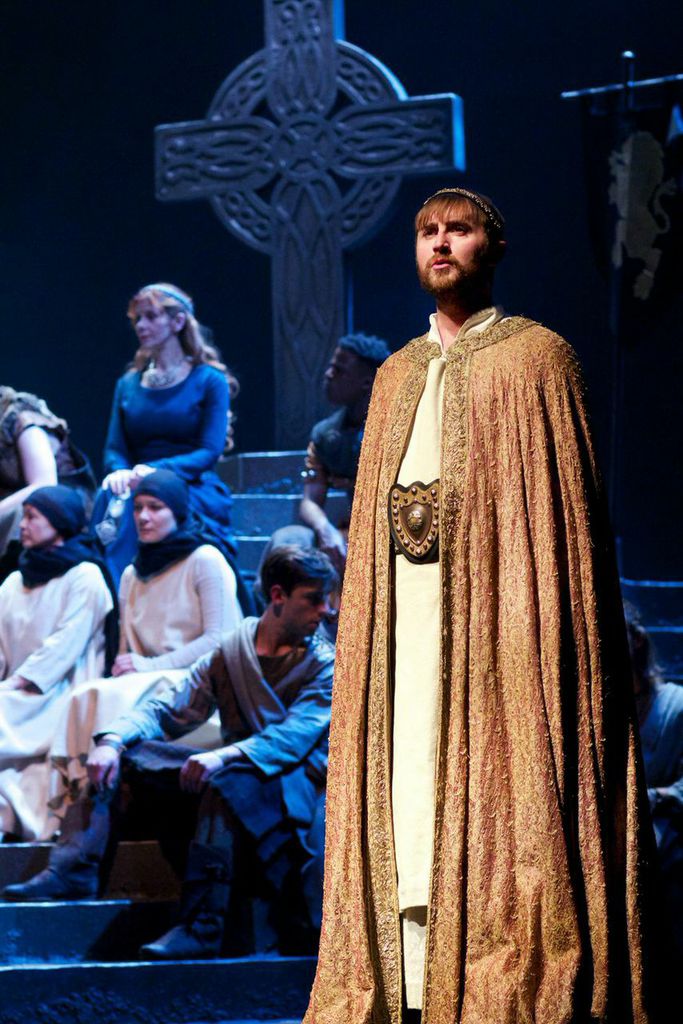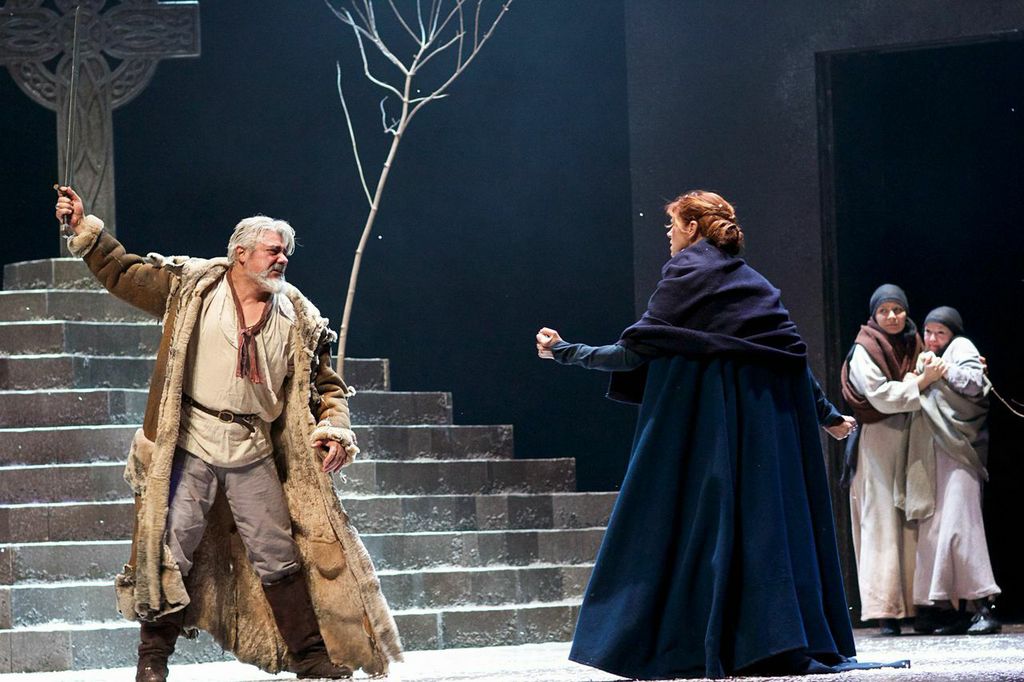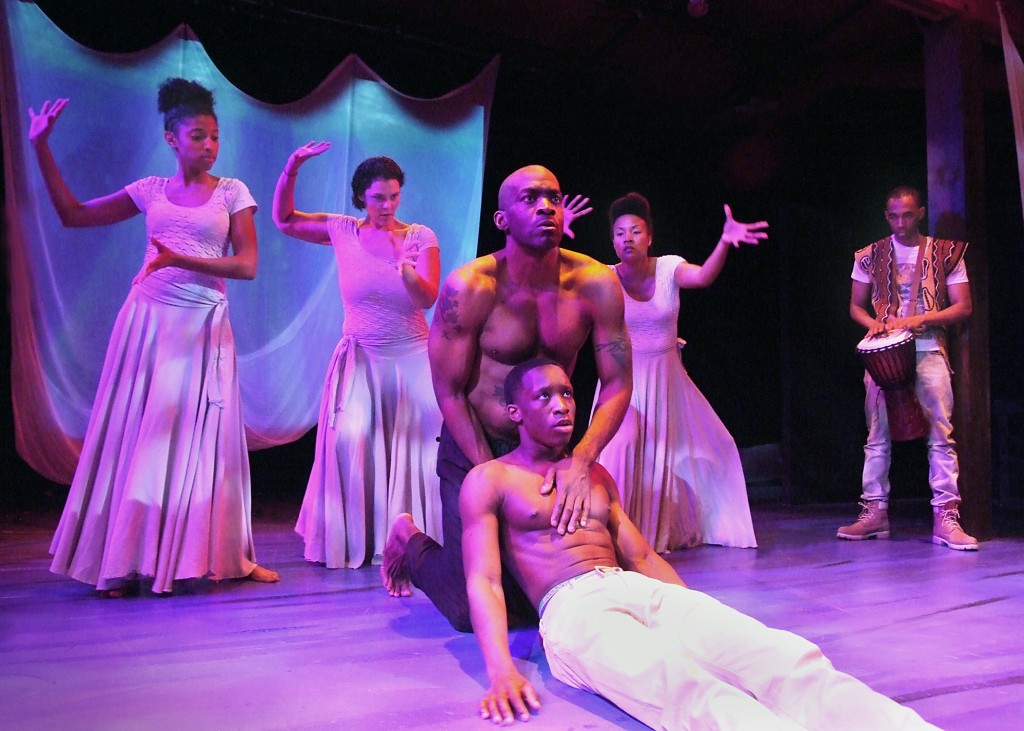A few words of warning.
This production of David Greig’s Dunsinane, by the National Theatre of Scotland, produced with the Royal Shakespeare Company, is not exactly a sequel to Macbeth. That name never comes up. While Dunsinane does follow the final events of the Shakespeare play, it has something else in mind. It makes a much broader statement about the unforeseen consequences of war and the much trickier ones of the pursuit of peace. It is a be-careful-what-you-wish-for kind of play in which the political winds blow hard and wantonly. Its events include plenty of onstage combat, and a lot of doublespeak delivered in brief snatches of Gaelic and the rest in what may be authentic, but often simply thick, if not impenetrable, brogues.
That said, the production at the Wallis is a swift, well-executed event that grows stronger and more engrossing as it moves along — with a second half filled with potent reverses of fortune, poignant drama and the unwelcome surprises of unwinnable wars.

The play opens when Malcolm (a sly, enigmatic Ewan Donald), titular heir to the Scottish throne, aided by the renegade Scottish general Macduff (Keith Fleming) and his British allies, wrest control of Scotland. However, they discover that the Scottish queen, here named Gruach (a commanding Siobhan Redmond), has survived the death of her husband at the hands of the invaders/defenders and has no intention of relinquishing her claim to the Scottish throne.

That doesn’t quite fit with the plans of the leader of the British forces, Siward (an impressive Darrell D’Silva), a man determined to do good by bringing peace to Scotland. Siward is eventually seduced and then betrayed by… whom exactly? The opportunistic Gruach, the venal Malcolm or simply the impossibility of dealing with the clashes of the Scottish clans? Political intrigue, back-stabbing (some of it literal), and other contestations result — as they usually do — in massive failures of intent.
If this sounds a lot like a couple of modern-day wars we know, with their duplicitous battlefields and the near-impossibility of resolving sectarian conflicts, that is precisely Greig’s point. He makes no secret of it. To quote him: “The emotional pull to ‘do the right thing’ is an innate human desire … a desire, however, both attractive and dangerous, as the definition of the ‘right thing’ often changes from person to person, country to country. Wherever Dunsinane goes, new audiences interpret and bring different context to the play.”
This kind of open interpretation is probably the highest and most obvious praise one can heap on a work of dramatic theatre. Some may find it too obvious, but the repartee, when it can be understood, is arresting. It certainly demonstrates the folly of presuming to impose an unsolicited peace (or war?) on another nation, neighboring or not.
The production’s greatest attribute is its large, mostly young, finely tuned company, with the skillful ensemble work it achieves under Roxana Silbert’s swirling direction. (It is notable that the National Theatre of Scotland has no real estate to call home and that the Dunsinane company remains fluid, changing freely, even in the composition of it creative artists, from production to production.)

A trio of terrific musicians subliminally punctuates the action with a throbbing original score by Nick Powell. They are Rosalind Acton (musical director and cello), Robert Owen (fantastic on the drums) and Andy Taylor on guitar.
On the negative side, those pesky brogues do get in the way. With a first half filled with the confusing heat of battle — bows and flying arrows and clashing swords (movement director is Ann Morrissey) and so much yelling going on — a shorter and clearer trajectory would have helped. Given the mostly dim lighting by Chahine Yavroyan and the largely indistinguishable military uniforms (Robert Innes Hopkins is responsible for the overall design), it does take a minute or three to sort out who’s on whose side, doing what to whom and why.
For the most part, the second half leaves those physical battles behind, becoming at once more provocative, reflective and nuanced as it exposes the complexity of colliding impulses and issues and how they resonate for us. That message is clear; the earlier battles are not and it takes a fair amount of time and mental reconstruction to get all of the identities straight.
Just, you might say, as it does in modern warfare.
WHAT: Dunsinane
WHERE: Bram Goldsmith Theatre at the Wallis, 9390 N. Santa Monica Blvd., Beverly Hills, CA 90210.
WHEN: Today & Friday 8pm; Saturday, 3 & 8pm; Sunday, 2 & 7pm. Ends Sunday, April 5.
HOW: Tickets, $29-$110, available by phone at 310.746.4000 or online at www.thewallis.org or in person at the Wallis Ticket Services, 9390 N. Santa Monica Blvd. ,Beverly Hills, CA 90210.
Top image: Members of the cast of Dunsinane at the Wallis.
All photos by KPO Photo.
… and Dontrell at the Skylight
Meanwhile, The Skylight Theatre Company, in association with Lower Depth Ensemble wrapped up the Los Angeles run of Dontrell Who Kissed The Sea, a whimsical and engaging play by Nathan Alan Davis about a smart 18-year-old African American named Dontrell Jones III, who feels a compulsion to dive into the deep Atlantic in search of an ancestor who jumped ship during the Middle Passage.
Written in a muscular mix of Hip-Hop jargon and Rap, laced with a good deal of humor and strong elements of magic realism, it is faintly reminiscent of August Wilson’s Gem of the Ocean. That play also visits the depths of the Atlantic in an ancestral quest, but on a more serious level, so the similarity is more circumstantial than real.

The Skylight production used basic yet imaginative elements by way of settings, a strong cast and direction by Gregory Wallace. I caught up with Dontrell too late to recommend it, since it closed last Sunday, but the play, if not this particular production, is part of the National New Play Network (NNPN) and its program of Rolling World Premieres. This is a countrywide alliance of participating nonprofit companies whose Continued Life of New Plays Fund makes it possible for them to mount and hone their own versions of the same new play in an effort to provide what its name says it will: a continued life for a new play deemed worthy of such an effort.
L.A.’s Fountain Theatre has benefitted twice from NNPN’s Rolling World Premieres with Stephen Sachs’ Bakersfield Mist and his Sweet Nothing In My Ear. Coming up for Dontrell in the next four months are productions at Cleveland’s Public Theatre (Cleveland, OH), The Phoenix Theatre (Indianapolis, IN), Theatre Alliance (Washington, DC) and the Oregon Contemporary Theatre (Eugene, OR).
